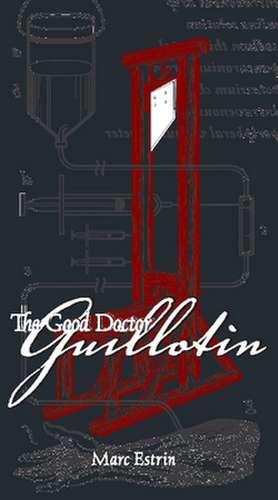The Good Doctor Guillotin: An Anatomy of Five
Autor Marc Estrinen Limba Engleză Paperback – 7 oct 2009
Preț: 61.78 lei
Preț vechi: 76.68 lei
-19% Nou
Puncte Express: 93
Preț estimativ în valută:
11.82€ • 12.64$ • 9.86£
11.82€ • 12.64$ • 9.86£
Carte indisponibilă temporar
Doresc să fiu notificat când acest titlu va fi disponibil:
Se trimite...
Preluare comenzi: 021 569.72.76
Specificații
ISBN-13: 9781932961850
ISBN-10: 1932961852
Pagini: 340
Dimensiuni: 130 x 226 x 22 mm
Greutate: 0.4 kg
Editura: Unbridled Books
ISBN-10: 1932961852
Pagini: 340
Dimensiuni: 130 x 226 x 22 mm
Greutate: 0.4 kg
Editura: Unbridled Books
Recenzii
"Like most of Estrin’s work, the novel is about much more than its title indicates–the nature of revolution, science and the state, poverty and freedom...the results are entertaining, intellectually stimulating, and not exactly predictable. Check it out." — Ron Jacobs author of Dissident Voice
"...atmospheric. Readers with an interest in history and politics will find the story especially fascinating." — ForeWord Magazine
Descriere
The Good Doctor Guillotin follows five characters to a common destination—the scaffold at the first guillotining of the French Revolution:
Dr. Guillotin, of course, a physician and member of the National Assembly, involved in many important events, including the Tennis Court Oath. Nicolas Pelletier, the first victim—or “patient,” as they were sometimes called, since the new beheading machine was seen as a humanitarian medical intervention in the state’s technique of dealing death.
Father Pierre, the curé who accompanies Pelletier in his last days, a man torn between his religious commitment, and an equally strong commitment to the poor and their revolution.
Sanson, the famous executioner of Paris who, 9 months later would execute the king and retire from remorse.
Tobias Schmidt, builder of the new machine, a German piano maker working in Paris, a freethinker predicting the Terror that will follow, but allowing himself to initiate it. The revolution, after all, had reduced the sale of pianos.
Various other interesting figures briefly appear:
Damiens, Mozart, Mesmer, Louis XVI, the Marquis de Sade, Marat, Robespierre, Demoulins among them. The eighteenth century narrative is divided into several sections, each introduced by an essay in the author’s voice, the first on five-ness and Pentagons; a second on hope and Utopia; a third on revolutionary violence; and a fourth on capital punishment.
This is no “historical novel.” It is, rather, a fictive meditation on a contemporary conundrum using an eighteenth century drum.
Dr. Guillotin, of course, a physician and member of the National Assembly, involved in many important events, including the Tennis Court Oath. Nicolas Pelletier, the first victim—or “patient,” as they were sometimes called, since the new beheading machine was seen as a humanitarian medical intervention in the state’s technique of dealing death.
Father Pierre, the curé who accompanies Pelletier in his last days, a man torn between his religious commitment, and an equally strong commitment to the poor and their revolution.
Sanson, the famous executioner of Paris who, 9 months later would execute the king and retire from remorse.
Tobias Schmidt, builder of the new machine, a German piano maker working in Paris, a freethinker predicting the Terror that will follow, but allowing himself to initiate it. The revolution, after all, had reduced the sale of pianos.
Various other interesting figures briefly appear:
Damiens, Mozart, Mesmer, Louis XVI, the Marquis de Sade, Marat, Robespierre, Demoulins among them. The eighteenth century narrative is divided into several sections, each introduced by an essay in the author’s voice, the first on five-ness and Pentagons; a second on hope and Utopia; a third on revolutionary violence; and a fourth on capital punishment.
This is no “historical novel.” It is, rather, a fictive meditation on a contemporary conundrum using an eighteenth century drum.
